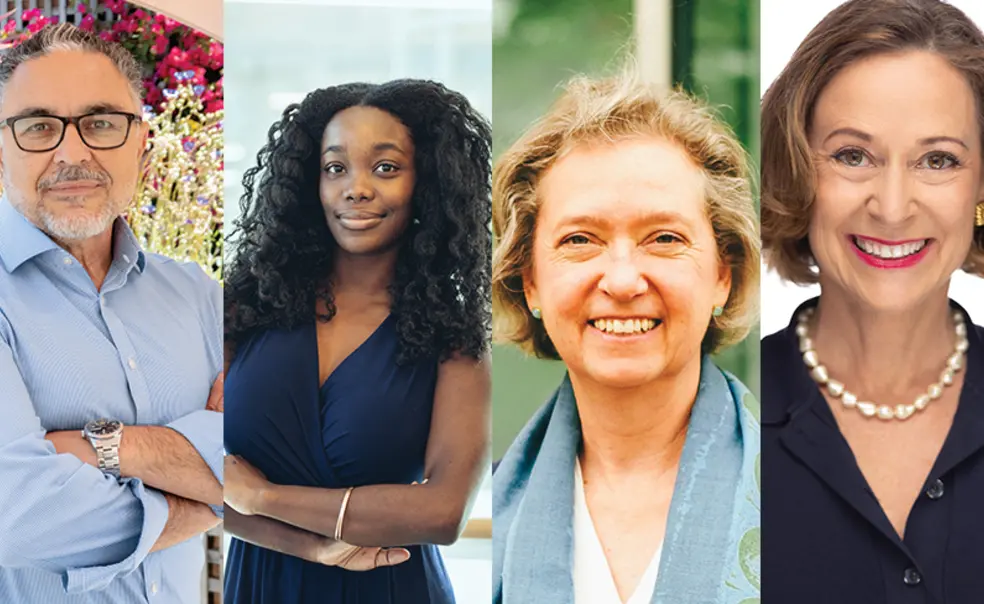How MacKenzie Scott ’92’s Gifts Have Aided the Work of These Princeton Alumni
Four of the two dozen nonprofit leaders PAW randomly surveyed about the impact of grants from philanthropist MacKenzie Scott ’92 happen to be Princeton alumni themselves. Here’s more about their projects:
Betsy Biemann *89, CEO of Coastal Enterprises Inc., in Brunswick, Maine, heads one of few groups that caught Scott’s attention more than once. The community development financial institution received $10 million in 2020 — at the time its largest donation since being founded in 1977 — only to have that record topped by $15 million more from Scott in 2024. Coastal Enterprises’ mission is to foster a just, vibrant, and climate-resilient future for families and communities that are underserved by traditional financial institutions, according to Biemann. Its primary tools are small-business financing, business coaching, and household financial advice. The grants from Scott landed at times of extraordinary uncertainty — the first during the COVID pandemic, the second as the federal government was cutting streams of funding that normally reach communities like the ones Coastal Enterprises serves. Since Scott never places restrictions on how her money can be used, Coastal Enterprises could be “nimble” and shift funds to where it was needed most, Biemann says. “Her resources are more important than ever.”
One way Scott’s money flowed into the community was in the form of a childcare business lab that Coastal Enterprises created to help first-time entrepreneurs meet the rising demand for reliable childcare. “I knew childcare, I didn’t know business,” says Melissa Holt, a childcare teacher who attended the lab and got a business loan on favorable terms from Coastal Enterprises to start Growing Minds Early Learning Center in Bangor. “I started with four staff and 19 families, and I currently employ 30 staff and have 75 families enrolled in the center.”
Kahina Haynes ’11, executive director of the Dance Institute of Washington, in Washington, D.C., participated in a round of giving last year when Scott departed from her standard pattern for making gifts. Typically, Scott’s donations can’t be solicited. This time, she invited groups to apply for 250 grants of $1 million each. Impressed by the response, Scott decided to enlarge and enrich the pot, awarding $2 million to each of 279 organizations, and $1 million to each of 82 groups. Haynes had applied for $1 million and ended up receiving $2 million. Currently serving nearly 1,500 young people, the Dance Institute seeks to diversify participation in ballet and dance training through a holistic instructional program that takes into account academic and life skills.
Scott’s money “gave me the space to begin to actually envision and think about not just next year, but what I might do and how this intervention work might look if I can actually plan for three, five, seven years, and that's been incredible,” Haynes says.
Kathy Roth-Douquet *91, CEO of Blue Star Families, in Encinitas, California, says the $10 million that Scott donated in 2022 was “game-changing.” It allowed the organization to expand the reach of programs to help military families build connections within the civilian communities where they live, and to enable civilian families to form bonds with their military neighbors. “We were able to say, ‘Where do we want to go? What investments do we need to make now in order to trigger that growth?” says Roth-Douquet, who just completed a term as a Princeton trustee. “It worked out in spades.”
Blue Star has nearly 380,000 families as members. “What I see in Mackenzie Scott's giving is a real belief in the American experiment,” Roth-Douquet says. “The idea that all of us together can build something that's even better for all of us together, that the social contract that we're involved in isn't a give or a get. It's a joint enterprise, and it's a very profound engagement.”
José Quiñonez *98, founder of the Mission Asset Fund, in San Francisco, cried with relief and gratitude when a caller representing Scott told him on the phone in 2021 that his organization would receive $45 million for its work helping people gain access to credit and financial stability. The families he served were being hit hard by the COVID pandemic. Quiñonez used some of the money to expand an emergency grants program for immigrant families who lost income due to the pandemic. He also launched a pilot program that guaranteed families an income of $400 a month for up to two years, combined with financial coaching and neighborhood lending circles. The purpose was to study the impact of a temporary period of guaranteed income on long-term economic health. “Because of MacKenzie Scott, we were able to say, let’s take this opportunity … to learn more,” Quiñonez says. His organization is analyzing the results now.











No responses yet